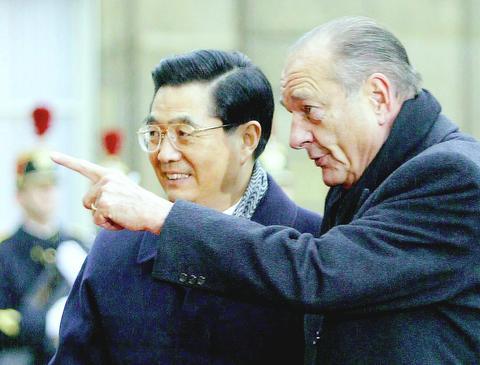France's president, in a strong show of support for the visiting leader of China, warned Taiwan that it will be committing a "grave error" that could destabilize the region by holding a referendum in March.
At a state dinner Monday to honor Chinese President Hu Jintao (胡錦濤), French President Jacques Chirac added his weight to China's opposition to President Chen Shui-bian's (陳水扁) plan to ask voters whether Taiwan should beef up anti-missile defenses if Beijing refuses to withdraw the hundreds of missiles it has pointed at Taiwan.

PHOTO: EPA
"Breaking the status quo with a unilateral destabilizing initiative, whatever it is, including a referendum, would favor division over unity," Chirac said. "It would be a grave error. It would carry a heavy responsibility."
Speaking later, Hu thanked Chirac for his "clear position of principle ... against the moves by the Taiwanese authorities that tend toward the independence of Taiwan through a referendum."
"We firmly oppose the independence of Taiwan and will not let anyone separate Taiwan from the rest of China in one way or another," Hu said.
But Chirac also pressed for human rights improvements in China, urging Hu to lead his country of 1.3 billion people "resolutely down the track of democracy and of liberties," to match its impressive economic transformation.
"Respect for human rights is a necessary condition for the development of modern societies and economies," Chirac said. "I know it is one of your priorities."
According the Chinese leader a rare honor, Chirac went himself to Paris' Orly airport to meet Hu and his wife, Liu Yongqing. The two men inspected a military guard as a band played China's anthem, March of the Volunteers, followed by France's Marseillaise.
Hu said closer ties between the two permanent members of the UN Security Council, who both opposed the US-led war in Iraq, would help promote "peace, stability and prosperity in the world."
Hu and Chirac discussed Iraq, Iran, the Middle East and Afghanistan, but not human rights, at a meeting Monday afternoon, Chirac spokeswoman Catherine Colonna said.
Chirac told Hu that France backs Chinese efforts to peacefully defuse tensions on the Korean peninsula stemming from North Korea's nuclear weapons program.
The state visit was Hu's first to Western Europe since he ascended to the presidency last March.
But human rights, a key concern in the country that spawned the declaration of the rights of man in 1789, overshadowed the official agenda. In protest at Chinese abuses, some lawmakers said they would boycott Hu's address to the French parliament yesterday.
"Nothing obliges us to listen to him who leads the world's biggest dictatorship," Lionnel Luca, a lawmaker from Chirac's UMP party, said on France-Info radio.
"China is not the smiling face it seems," he said.
Rather than hear Hu, Luca will join protesters against China's policies in Tibet at a demonstration scheduled to coincide with the speech, said Luca's parliamentary aide, Marie Huteau.

DAREDEVIL: Honnold said it had always been a dream of his to climb Taipei 101, while a Netflix producer said the skyscraper was ‘a real icon of this country’ US climber Alex Honnold yesterday took on Taiwan’s tallest building, becoming the first person to scale Taipei 101 without a rope, harness or safety net. Hundreds of spectators gathered at the base of the 101-story skyscraper to watch Honnold, 40, embark on his daredevil feat, which was also broadcast live on Netflix. Dressed in a red T-shirt and yellow custom-made climbing shoes, Honnold swiftly moved up the southeast face of the glass and steel building. At one point, he stepped onto a platform midway up to wave down at fans and onlookers who were taking photos. People watching from inside

A Vietnamese migrant worker yesterday won NT$12 million (US$379,627) on a Lunar New Year scratch card in Kaohsiung as part of Taiwan Lottery Co’s (台灣彩券) “NT$12 Million Grand Fortune” (1200萬大吉利) game. The man was the first top-prize winner of the new game launched on Jan. 6 to mark the Lunar New Year. Three Vietnamese migrant workers visited a Taiwan Lottery shop on Xinyue Street in Kaohsiung’s Gangshan District (崗山), a store representative said. The player bought multiple tickets and, after winning nothing, held the final lottery ticket in one hand and rubbed the store’s statue of the Maitreya Buddha’s belly with the other,

Japan’s strategic alliance with the US would collapse if Tokyo were to turn away from a conflict in Taiwan, Japanese Prime Minister Sanae Takaichi said yesterday, but distanced herself from previous comments that suggested a possible military response in such an event. Takaichi expressed her latest views on a nationally broadcast TV program late on Monday, where an opposition party leader criticized her for igniting tensions with China with the earlier remarks. Ties between Japan and China have sunk to the worst level in years after Takaichi said in November that a hypothetical Chinese attack on Taiwan could bring about a Japanese

‘COMMITTED TO DETERRENCE’: Washington would stand by its allies, but it can only help as much as countries help themselves, Raymond Greene said The US is committed to deterrence in the first island chain, but it should not bear the burden alone, as “freedom is not free,” American Institute in Taiwan Director Raymond Greene said in a speech at the Institute for National Defense and Security Research’s “Strengthening Resilience: Defense as the Engine of Development” seminar in Taipei yesterday. In the speech, titled “Investing Together and a Secure and Prosperous Future,” Greene highlighted the contributions of US President Donald Trump’s administration to Taiwan’s defense efforts, including the establishment of supply chains for drones and autonomous systems, offers of security assistance and the expansion of